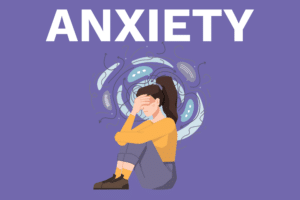Are you tired of anxiety holding you back? Does the constant worry and fear disrupt your daily life, affecting your work, relationships, and even your sleep? You’re not alone. Millions of people worldwide struggle with anxiety, but the good news is, there is a path to freedom. Fortunately, the journey to recovery doesn’t always require a complete pause from life. Outpatient treatment for anxiety has emerged as a beacon of hope for those seeking effective support while maintaining their daily routines.
In this blog, we’ll explore the transformative benefits of outpatient anxiety treatment centers, shedding light on how they offer a path to freedom from the grips of anxiety.

Understanding Outpatient Anxiety Treatment Centers:
Unlike inpatient hospitalization, outpatient anxiety treatment centers offer support and effective therapies while allowing you to maintain your regular life. This means continuing your work or studies, living at home, and engaging in everyday activities, all while receiving the help you need to manage your anxiety.
These centers, staffed by mental health professionals specializing in anxiety disorders, provide a safe and supportive environment to learn coping mechanisms, challenge negative thought patterns, and develop a personalized plan for overcoming your anxiety.
At outpatient anxiety treatment centers, flexibility becomes a key element in crafting a personalized roadmap to recovery.
Beyond Therapy: A Holistic Approach:
Outpatient treatment for anxiety goes beyond traditional therapy sessions. Many centers offer a holistic approach, incorporating various evidence-based modalities to address the different facets of anxiety. This might include:
- Cognitive Behavioral Therapy (CBT): The gold standard for anxiety treatment, CBT helps you identify and modify unhelpful thinking patterns that contribute to your anxiety. By learning to challenge negative thoughts and develop healthier coping mechanisms, you can regain control over your emotions and behavior.
- Exposure Therapy: Gradually facing your fears in a safe and controlled environment, this therapy helps desensitize you to triggers and reduce anxiety responses.
- Relaxation Techniques: Mindfulness meditation, deep breathing exercises, and yoga can equip you with powerful tools to manage stress and anxiety in the moment.
- Medication Management (if needed): Some individuals may benefit from medication in conjunction with therapy, especially for cases of severe anxiety. Psychiatrists at the center can assess your needs and prescribe appropriate medication, if necessary.
- Support Groups: Sharing experiences and learning from others with similar struggles can build a sense of connection and reduce feelings of isolation.
Additional Support:
- Skill-Building Workshops: These interactive sessions equip you with practical tools for managing everyday challenges like assertiveness training, communication skills, and stress management.
- Educational Resources: Gaining knowledge about your anxiety can empower you and reduce feelings of helplessness. Many centers offer access to educational materials and resources.
- Community Outreach: Connecting with support groups, advocacy organizations, and online communities can broaden your network and provide ongoing support beyond the treatment center.
Remember, Treatment is a Journey:
- Progress over Perfection: There will be ups and downs. Celebrate small victories and acknowledge setbacks as temporary hurdles.
- Open Communication: Don’t hesitate to express concerns or ask questions to your therapist. Open communication is key to a successful partnership and progress.
- Self-Compassion: Be kind to yourself. Healing takes time and effort. Celebrate your progress and embrace the journey of regaining control over your anxiety.
Choosing outpatient treatment for anxiety reflects a commitment to your mental health. By understanding what to expect – from the initial assessment to skill development and regular check-ins – you can approach this process confidently. Your journey toward mental wellness is unique, and outpatient anxiety treatment provides a supportive framework for you to regain control, nurture resilience, and discover lasting relief.
Finding the Right Outpatient Anxiety Treatment Center:
With so many outpatient anxiety treatment centers available, finding the right one is crucial. Research facilities in your area, inquire about their treatment methodologies and seek recommendations from your doctor or therapist. Look for a center that aligns with your needs and preferences, offering the therapies and approaches you feel most comfortable with.
Outpatient anxiety treatment centers don’t just treat symptoms; they empower you to reclaim control of your life. Through individual and group therapy sessions, skills training workshops, and personalized treatment plans, you’ll learn valuable tools to manage your anxiety, cope with triggers, and build resilience. You’ll discover a supportive community of peers who understand your struggles and can offer encouragement and empathy.
Understanding Intensive Outpatient Programs (IOPs)
An IOP stands for Intensive Outpatient Program, and it’s a structured non-residential treatment program designed to address mental health disorders and substance abuse issues, particularly when they require more support than traditional weekly outpatient therapy but don’t necessitate 24/7 supervised care like inpatient programs.
Here’s a breakdown of the key points:
- Intensive: Compared to standard outpatient therapy, IOPs offer significantly more hours of treatment, typically ranging from 3 to 4 hours per day, 3 to 5 days a week. This intensive schedule allows for a deeper exploration of issues and the development of coping skills.
- Outpatient: Unlike inpatient programs where you reside at a treatment facility, IOPs allow you to return home each day. This provides flexibility for those needing to maintain work, school, or family commitments.
- Program-based: IOPs have structured programs with a mix of individual and group therapies, educational sessions, skills training workshops, and other activities tailored to specific needs, like managing anxiety, developing relapse prevention strategies, or building healthy coping mechanisms.
Benefits: IOPs can be helpful for:
- Individuals transitioning from inpatient treatment to independent living
- People requiring more support than weekly therapy but not needing around-the-clock supervision
- Those coping with moderate to severe anxiety, depression, substance abuse, or other mental health challenges
Finding an IOP
If you’re interested in learning more about IOPs, talk to your doctor or therapist. They can help you assess your needs and find a qualified program in your area. You can also research options online and contact different centers directly to inquire about their programs and schedules.
Remember, seeking help for mental health is a brave and crucial step towards living a fulfilling life. IOPs can offer the intensive support and guidance you need to manage your anxieties and build a path towards recovery.
Stepping Out of Anxiety: A Guide to Outpatient Treatment Centers
Outpatient anxiety treatment centers serve as invaluable havens for individuals grappling with anxiety disorders, offering a secure and supportive space for their journey toward mental well-being. These centers employ evidence-based therapies, including cognitive-behavioral therapy (CBT) and exposure therapy, aimed at equipping individuals with effective tools to manage anxiety and enhance their overall quality of life.
Key Benefits of Outpatient Anxiety Treatment:
1. Flexibility: Outpatient treatment ensures that individuals can seamlessly integrate therapy into their daily routines, allowing them to continue with work or school while receiving the necessary care.
2. Personalized Care: Each person’s journey is unique, and outpatient treatment centers recognize this by tailoring individualized treatment plans to meet specific needs and goals.
3. Support Groups: Many centers facilitate support groups, providing a platform for individuals to connect with others facing similar challenges. This sense of community fosters understanding and solidarity.
4. Symptom Reduction: Outpatient treatment is designed to alleviate anxiety symptoms, leading to an overall improvement in well-being and a more fulfilling life.
Considerations for Individuals Considering Outpatient Anxiety Treatment:
1. Qualified Therapists: Ensure that the therapist you choose is licensed and has experience in treating anxiety disorders.
2. Treatment Approach: Different centers employ varied approaches to treatment. Seek a center that aligns with your comfort and preferences.
3. Realistic Expectations: Recognize that treatment is a gradual process, requiring time and effort. Immediate results should not be anticipated.
Tips for Finding an Outpatient Anxiety Treatment Center:

1. Doctor Referral: Consult with your primary care doctor for a referral to reputable outpatient anxiety treatment centers.
2. Insurance Coverage: Check with your insurance company to determine which centers are covered, easing the financial aspect of treatment.
3. Online Search: Utilize online resources to find centers in your vicinity. Reading reviews can provide valuable insights into the experiences of others.
4. Consultation: Once you’ve identified a potential center, schedule a consultation to meet with a therapist and gain a deeper understanding of their program.
Embarking on outpatient treatment for anxiety can be a transformative journey for those wrestling with anxiety disorders. If you’re contemplating seeking such treatment, I strongly encourage you to connect with a qualified therapist today. The right support and guidance can make a profound difference in your path towards lasting mental wellness.
The Final Say:
In rewriting the final chapter of your anxiety story, consider the promise of outpatient treatment for anxiety. It’s not a quick fix, but rather a powerful catalyst for change. These centers, like Beacons of hope, offer evidence-based therapies such as CBT and exposure therapy.
You’re not alone in this journey. Outpatient anxiety treatment centers stand ready with open arms, providing the tools and support to reshape your narrative. Support groups become your cheerleaders, educational resources your shield, and mindfulness techniques your anchor.
Expect hurdles, setbacks, and moments of doubt. Yet, with each challenge, there’s an opportunity to grow, refine coping mechanisms, and discover your inner strength. Outpatient treatment for anxiety is a commitment to your well-being and a promise to reclaim the life you deserve.
Take that deep breath, quiet the doubts, and reach out. Contact an outpatient anxiety treatment center, and begin rewriting your story. Break free from anxiety’s chains with the right support, defining a future filled with peace, confidence, and boundless possibilities—one chapter of calm at a time.
Additional Resources:
Anxiety and Depression Association of America: https://adaa.org/
National Institute of Mental Health: https://www.nimh.nih.gov/health/topics/anxiety-disorders
MentalHealth.gov: https://www.samhsa.gov/mental-health









